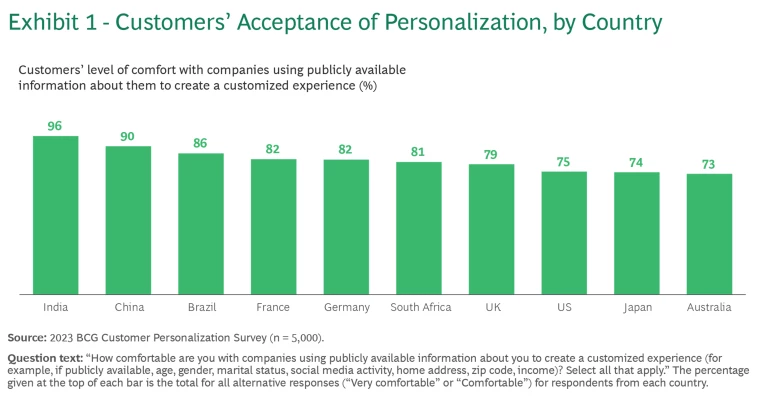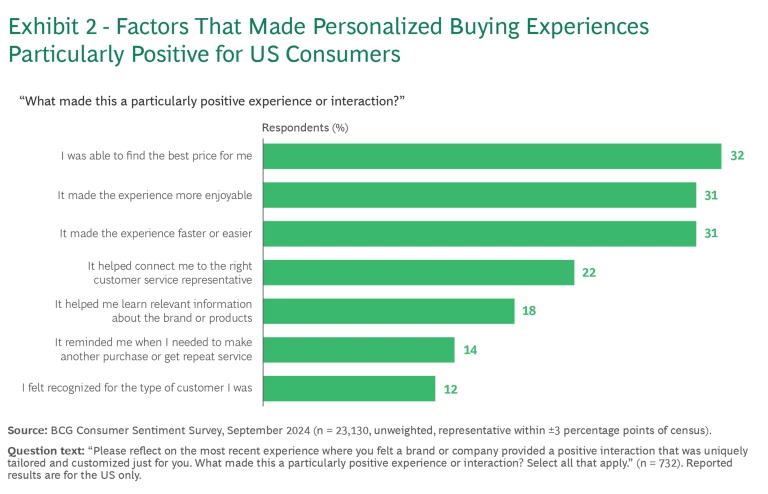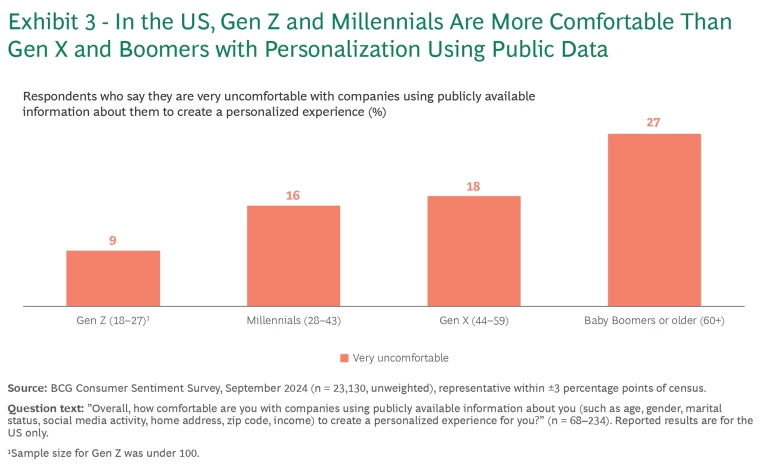This year, in a portion of our BCG Global Consumer Radar Survey, we conducted one of the largest studies ever completed on consumer perceptions of and attitudes about
personalization
. In our research with over 23,000 consumers around the world, we explored whether, why, and with what data customers would like their experiences to be personalized.
Should Brands Personalize?
We already know from our earlier research that the answer to this question is a resounding yes. Approximately four-fifths of customers globally tell us that they are comfortable with personalized experiences, and a large majority say they expect companies to do it. (See Exhibit 1.)

But our research also provides a note of caution. Two-thirds of customers say that they have recently had at least one personalized experience with a brand that was inaccurate or invasive. In many instances, these experiences caused the customers to unsubscribe, disengage, or simply not come back.
Why Should Brands Personalize?
In our latest research, we dove into the question of why consumers liked particular interactions that were uniquely tailored and customized to them. Three reasons stood out: value, enjoyment, and convenience. (See Exhibit 2.)

Value. Not surprisingly, the most frequently cited reason across countries for appreciating personalization was that it enabled consumers to find the best price. Customers consistently reported liking personalized offers and discounts. Restaurants like McDonald’s and Sweetgreen, grocery stores like Woolworth’s in Australia and Sobey’s in Canada, mass retailers like Target, and beauty retailers like Sephora, Boots, and Ulta Beauty have successfully launched personalized offers. Increasingly, companies are shifting their investments from mass promotions to personalized offers, and focusing on personalization use cases that offer better value to customers can be good business: we find that personalized offers consistently generate three times higher ROI than mass promotions do.
Nevertheless, focusing exclusively on personalized value can cause companies to miss other opportunities to connect with customers on a personal level.
Enjoyment. Customers cited a more enjoyable experience as one of the top reasons they like personalized interactions. For example, Marriott recognizes that travel is an inherently emotional journey and that customers are likely to remember “surprise and delight” touches during their hotel stay. This awareness factored into the company’s decision to relaunch its personalized Ambassador service. Similarly, Starbucks recently announced that its baristas will start writing customers’ names on cups again, restoring a customized touch in the morning coffee routine. Macy’s is testing a membership service called Red Carpet that will give customers access to a dedicated concierge, priority stylist bookings, and various members-only savings and other benefits. In the world of music, some artists provide their top fans with once-in-a-lifetime personalized experiences such as backstage passes and access to exclusive performances—but even early access to content can feel incredibly special. Although the immediate impact of this kind of personalization is difficult to measure, the results show up over time in improved brand health and customer lifetime value measures.
Convenience. Making an experience faster or easier through personalization is just as important to customer satisfaction as delivering value or enhancing enjoyment. Amazon Prime pioneered easy one-click shopping by using customers’ existing data. Today, companies across a wide range of industries are applying similar approaches to make every next interaction with a new customer seamless. Voya, a provider of health insurance and asset management services, launched a “myVoyage” tool where customers can link their financial and health information and receive tailored and timely recommendations on how to achieve their goals—for example, by paying down student debt or making smart choices about retirement benefits. Restaurant chains make it easy for customers to reorder their favorite items via their mobile apps. Fashion and beauty retailers provide “complete the look” recommendations for consumers shopping for individual items on their websites. Using personalization in these ways can increase conversion and cross-sell rates by 30% to 40%.
Subscribe to our Marketing and Sales E-Alert.
Better value, greater enjoyment, and heightened convenience are not the only reasons customers like personalization. They also cited being able to connect more easily to the right customer service agent, discovering new products, getting replenishment reminders, and feeling recognized as loyal customers as areas where personalized interactions can be helpful. We believe that brands should prioritize improving the customer experience in multiple ways—including some, such as personalized offers and recommendations, that drive immediate business returns, and others that work at a subtler level, such as customized touches that make the experience more enjoyable, recognize loyalty, and help customers discover products and services when and where they need them. In this way, brands can fund needed investments in personalization in the near term, while progressively boosting customer loyalty and satisfaction.
How Should Brands Personalize?
A clear sense of how to use personalization to empower customers is just the first step toward successful personalization. To deliver fully on the promise of personalization, brands must know their customers and get the data right, too, thereby avoiding inaccurate or invasive experiences.
We recommend that companies follow three principles in getting to know their customers:
- Ask wisely. So-called zero-party data (information that customers directly tell you) is the most valuable kind of data. But brands must decide what pieces of information they really need—and when a company asks its customers for data, it creates an expectation that it will use that data to make the experience better. Consequently, brands must be candid about why they are collecting data, how the data will be used (and shared), and what benefits consumers will enjoy as a result. Embedding one or two simple questions in an existing user flow can be quite effective. For example, loyalty programs can ask for information about product preferences at signup and use this data to improve product recommendations. One company we work with saw a 20% increase in opt-in rates after testing different types of consent language and different formats.
- Infer from your own data. First-party data (information that the company compiles from transactions and customer engagement across channels) is the lifeblood of any personalization effort. Companies should prioritize gathering what they need to know to fuel customized experiences and investing in data engineering efforts that create a single source of truth for key data features, updated with appropriate frequency (for example, real-time for recommendations in the app). They should also set up tools to resolve the identity of customers across their disparate data sources, assembling a more complete profile for each individual (and doing so at the level of a single person instead of a whole household).
- Smartly augment customer information. Often, the preceding two steps are not sufficient to effectively personalize the customer experience. Although some sources of third-party data are becoming scarcer with the decline of third-party cookies, others remain valuable for segmentation (for example, enriching customer profiles with geographic location, consumer needs and expectations, or attitudinal information). Our survey indicates that customers’ attitudes toward use of this data differ widely by age and by specific context. (See Exhibit 3.) In deciding whether to use third-party data, companies should consider the potential implications of getting incorrect information (for example, in testing with one client, we found that third-party data on gender drawn from one commonly used source was accurate only 60% of the time) and should continually test new sources of data for the most relevant items.

Although consumer attitudes about personalization are evolving across geographies, our survey shows that tailoring experiences to customers is imperative in many areas. With the right data in hand and with a clear view of the intended customer outcomes, companies can begin charting a blueprint for personalization. The next step is to line up the necessary AI , technology, content, and people processes to deliver it. For a complete description of personalization done right, see our recent Harvard Business Review article or read our new book, Personalized: Customer Strategy in the Age of AI .
Explore the results of our survey research more fully in Exhibits 4, 5, and 6.







